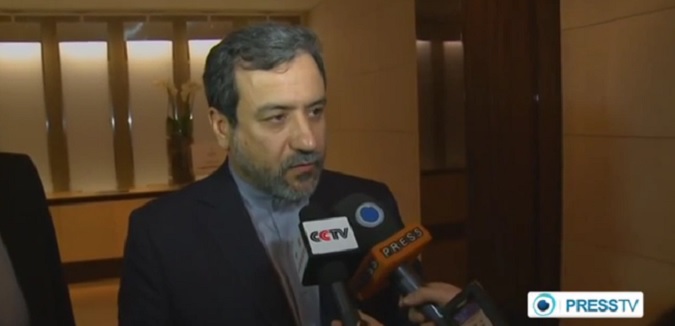The Daily Beast yesterday conveyed statements by Abbas Araqchi, Iran’s deputy foreign minister and its top nuclear negotiator, boasting that the concessions Iran has committed to making under the Joint Plan of Action (JPA) – and more specifically, its commitments regarding its stockpile of 20% uranium – can be reversed in one day. Iran has committed to halting enrichment to 20%, diluting half of its existing 20% stockpile to 5% levels, and converting the other half to an oxide form in which it can’t be further enriched.
“We can return again to 20 percent enrichment in less than one day and we can convert the [nuclear] material again. Therefore the structure of our nuclear program is preserved,” said Araghchi, in a broadcast which was independently translated for The Daily Beast. “Whenever we feel the other side is not following through with its commitments, whenever we feel there are other motives involved, whenever—now, say, under pressure from Congress or something else—they take action against their commitments, say put in place new sanctions, we will immediately revert to the current status quo. And we will again continue our nuclear program in the form that it is today.”
“I can say definitively that the structure of our nuclear program will be exactly preserved. Nothing will be put aside, dismantled or halted. Everything will continue, enrichment will continue,” Araghchi said.
Substantively, the comments will draw attention to fundamental asymmetries in the JPA. The West’s sanctions concessions are straightforwardly irreversible because Iran will get to pocket the billions in financial relief it receives, and it will be difficult – many analysts, backed by a steady stream of new evidence have suggested that it will in fact be functionally impossible – to restore the structure of the international sanctions regime. Diplomatically, Araqchi’s boasts are likely to deepen concerns that the Iranians will exploit the JPA’s asymmetries and walk away from negotiations. Patrick Clawson and Mehdi Khalaji – respectively the director of research and a senior fellow at the Washington Institute – had published an opinion piece in mid-November suggesting that Iranian Supreme Leader Ayatollah Ali Khamenei was laying the groundwork to pocket Western concessions under an interim deal and walk away from further negotiations. An anti-U.S. lash-out by Khamenei later that month deepened those fears. Araqchi’s statements will be read within that debate, and may fuel concerns that Western negotiators lack sufficient leverage to force Iran to make robust concessions regarding its nuclear program. The worry is the basis for a Congressional push to pass legislation that would signal now that – should Iran abandon talks later – crippling sanctions would immediately be reposed. The White House has sought to halt momentum for the bill, in part by accusing its advocates of warmongering.
[Photo: Press TV Videos / YouTube ]




